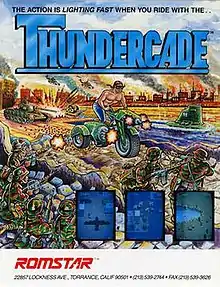| Thundercade | |
|---|---|
 Arcade flyer | |
| Developer(s) | SETA Micronics (NES) |
| Publisher(s) | SETA American Sammy (NES) |
| Platform(s) | Arcade, NES |
| Release | Arcade NES |
| Genre(s) | Scrolling shooter[2] |
| Mode(s) | Single-player[3] Multiplayer[3] |
Thundercade, also known as Twin Formation and 特殊部隊UAG (Tokushu Butai U.A.G., "Special Forces U.A.G. (Un-Attached Grenadier))", is a vertically scrolling shooter developed by SETA and released as an arcade game in 1987. A version for the Nintendo Entertainment System from American Sammy was released in 1989.
The original arcade flyer establishes that despite a 199X treaty eliminating all nuclear weapons, a certain northerly nation was suspected of developing such weapons in secret. Therefore, the United States of America military sends in the U.A.G. elite unit consisting of an armed motorcyclist and a support bomber to quell the threat.[4] The American NES version's manual describes a slightly different story, casting players as a part of Operation Thundercade, a special forces operation battling against the nuclear threat of the Atomic Age Terrorist Organization of Miracali (AATOM).[5][6]
Gameplay

Players control a motorcycle equipped with sidecar cannons and backed up by a B-7 bomber.[5] There are four levels in the game: an unnamed city, the terrorists' military base, the woodland regions, and the fortress containing the nuclear power plant.[6] Bosses include a submarine along with other screen-filling enemies.
Reception
In Japan, Game Machine listed Thundercade on their December 15, 1987 issue as being the seventh most-successful table arcade unit of the month.[7]
References
- ↑ Thundercade Arcade information at GameFAQs
- 1 2 Thundercade NES information at GameFAQs
- 1 2 Thundercade at Game Kult
- ↑ https://flyers.arcade-museum.com/videogames/show/1817
- 1 2 Thundercade at MobyGames
- 1 2 Thundercade at allgame
- ↑ "Game Machine's Best Hit Games 25 - テーブル型TVゲーム機 (Table Videos)". Game Machine (in Japanese). No. 322. Amusement Press, Inc. 15 December 1987. p. 25.